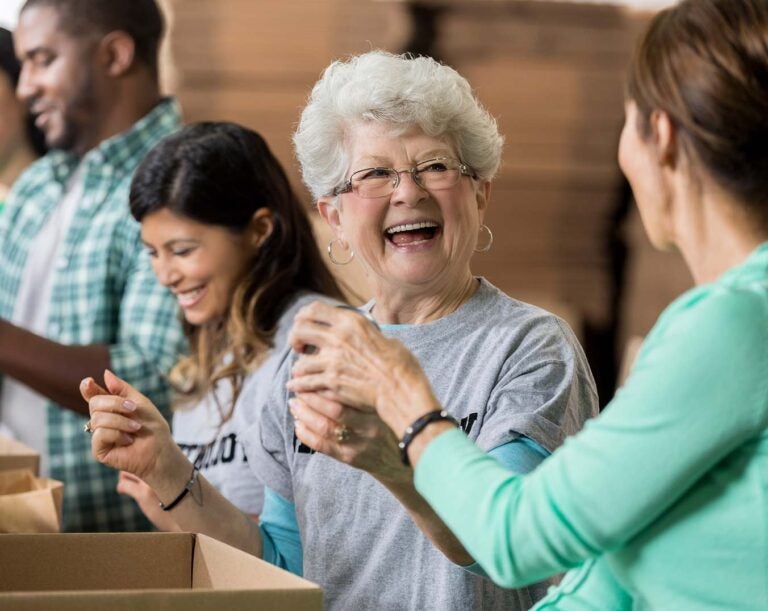When Bill Simpson, a retired sheriff’s deputy from St. Helen’s, Oregon, found himself isolated and “twiddling his thumbs” during the pandemic, he decided to start volunteering at a sanctuary for abused farm animals.
“I was tired of sitting around the house,” he says. “I was happy to help out.”
He started by applying his carpentry skills, making rooster runs, chicken coops, and barns. Soon enough, his part-time volunteer hours had expanded as he became increasingly involved in the organization’s operations. Now he goes there almost daily, spending full-time hours doing everything from repairs to animal feeds to emergency vet visits.
Simpson, 77, is not alone in his desire to add something meaningful to his life in retirement. After long, fruitful careers, many people find it challenging to find fulfillment in post-work life. Volunteering can be the answer: Whether taking on an international adventure or pursuing smaller tasks closer to home, retirees can add meaning and structure to their days by building the work of giving back into their lives.
Why Volunteer?
Volunteering can offer physical, mental, and social benefits to people of any age. But these can be particularly valuable to older adults with a particular need for physical and mental activity and may be more affected by isolation than younger people.
“It’s really important for people to connect with their community and find a way to spend time with people to care about the things that they care about,” says Jennifer Bennett, director of education and training at VolunteerMatch. She emphasizes that this is particularly the case after two long years of increased isolation due to the coronavirus pandemic.
You can get myriad things from volunteering: learning something new, challenging yourself, building new skills or using your professional-level skills you’ve shelved for a while, meeting new people, staying physically active, and gaining a feeling of satisfaction as you help a cause you care about.
“Getting out there and trying something new and making that connection — and doing some good while you’re doing it has benefits all the way around,” Bennett says.
For Jinnet Fowles, 75, of the Minneapolis area, one of the biggest benefits of volunteer work was getting a new perspective.
“[Volunteering] gives people a chance to reconsider their assumptions about life, and that’s a good thing to do,” she says. That’s especially true for volunteer activities that introduce you to new skills, people, places, and ideas. Accordingly, after retiring from a career as a health services researcher, she joined the Peace Corps and embarked on a two-year stint as a volunteer in the Kingdom of Tonga, an archipelago in the South Pacific.
“I have a philosophy that the worst disease of aging is the hardening of the categories, and I just wanted to do a reset,” she says. “I really wanted to shake things up.”
Ways to Volunteer
You don’t have to travel to the South Pacific to gain a tremendous amount from volunteering. While volunteering can be an international placement or an unpaid full-time job caring for farm animals, it can also look like a one-time beach cleanup, a tutoring session for local youth, a weekly engagement boxing up food at the local soup kitchen, or an every-other-month board meeting for a local nonprofit.
Here are only a few of the many ways to volunteer:
- Direct service. Put in time with organizations that provide immediate help to those who need it, such as Meals on Wheels, Habitat for Humanity, or local food pantries, soup kitchens, or animal shelters.
- Travel-based volunteering. The Peace Corps has no age limit, but there are many other ways to volunteer abroad or within your country’s borders. In the US, for example, the National Park Service depends on volunteers to help maintain trails and do research.
- Working with arts and culture organizations. You may find a good use for your professional skills by volunteering in local arts and culture, such as at the historical society, arts venues, or cultural organizations.
- Serving on boards. Local nonprofit organizations and institutions of all stripes depend on volunteers to serve on their boards and manage needs and priorities, particularly fundraising and community outreach.
- Helping the environment. There are many options for cleaning up and maintaining the natural environment, such as street or beach cleanups, tree planting, and animal rescue.
- Tutoring/mentoring. Many older adults have knowledge and skills they can teach to younger people, whether that means tutoring youth through the local YMCA or mentoring small business owners via the Small Business Administration’s SCORE program.
- Virtual volunteering. There are many ways you can contribute from the comfort of your own home, such as doing online tutoring, performing administrative tasks, or knitting blankets for babies.
How and Where to Find Opportunities
A tried-and-true method of finding volunteer opportunities is tapping your local network. Simpson found the animal rescue he joined through connections he made when adopting a dog. Neighbors, friends, former colleagues, and local social media groups are likely overflowing with ideas.
You can also reach out directly to organizations you’re interested in to inquire about their volunteer opportunities. See if they have a dedicated staff member to manage volunteers and contact that person.
There are also a variety of more formal ways to seek volunteer work. One is VolunteerMatch, which lists a huge range of opportunities all over the country and in some other countries. The site has a filter to allow searches for matches appropriate for people over 55. States and cities are also likely to have their own volunteer-matching organizations or sites. For instance, people in Portland, Oregon, can find opportunities at HandsOnPortland.org.
The federal government sponsors a number of avenues for seeking volunteer work. Chief among them is Americorps Seniors, which matches 200,000+ older volunteers with service opportunities every year. Also, look at Volunteer.gov, which lists opportunities in national parks, and SCORE, the SBA’s volunteer small business mentoring program. Many local libraries have a Friends of the Library group, which can also be a good place to look for ways to get involved.
Advice for Prospective Volunteers
While volunteer work can be casual and inconsistent, most volunteers get more out of a regular, ongoing engagement. It’s worth giving the opportunity some thought to ensure it’s the best match that will help you meet your volunteer goals.
“The idea is to learn more about what’s it really like to be a volunteer,” says Bennett. “Most organizations understand it’s a two-way street, and it has to work for both the organization and the volunteer.”
Here are some pieces of advice from the experts for prospective volunteers:
- Select what’s right for you. Look out for opportunities that match your beliefs and values and let you share your skills or learn something you’re interested in learning.
- Understand the requirements of the position. Check whether the physical demands of the opportunity may not be a match for your abilities or limitations.
- Look for acknowledgment in the relationship. Satisfying volunteer opportunities are two-way relationships in which the organization sees you as more than just a task rabbit. Look for organizations that are clear about expectations and treat you with respect and interest.
- Know your goals. Think about what you want to learn or do with your volunteer time and how much time you want to commit. Think about what it will look like to have succeeded with your volunteer goals. This might mean becoming more specific than saying, “I just want to help.” Ask yourself: What will it take to feel like my time was well-spent?
- Vet your choice. Make sure the organization you’re signing on with has a good reputation and can be trusted. This might be done for you, as with VolunteerMatch, which has requirements for joining its registry. But in other cases, you may need to call other volunteers or employees to learn more about the organization.
- Try it out before committing. It’s okay to try out an opportunity for a day or a little while before deciding whether to commit. Whatever you choose, the work of giving back is likely to make your retirement feel richer and more meaningful, as well as enhance your life in ways you may not have anticipated.
“You have the satisfaction of doing something to help,” says Simpson. “You’re giving something back, but you’re also getting something back—a better and healthier lifestyle mentally and physically. I think everybody should volunteer for something.”
Seniority is published by Finance of America Reverse LLC. The views expressed in this publication are those of the author alone and do not necessarily reflect the views and opinions of Finance of America Companies. This article is intended for general informational and educational purposes only and should not be construed as financial or tax advice. For more information about whether a reverse mortgage may be right for you, you should consult an independent financial advisor. For tax advice, please consult a tax professional.




